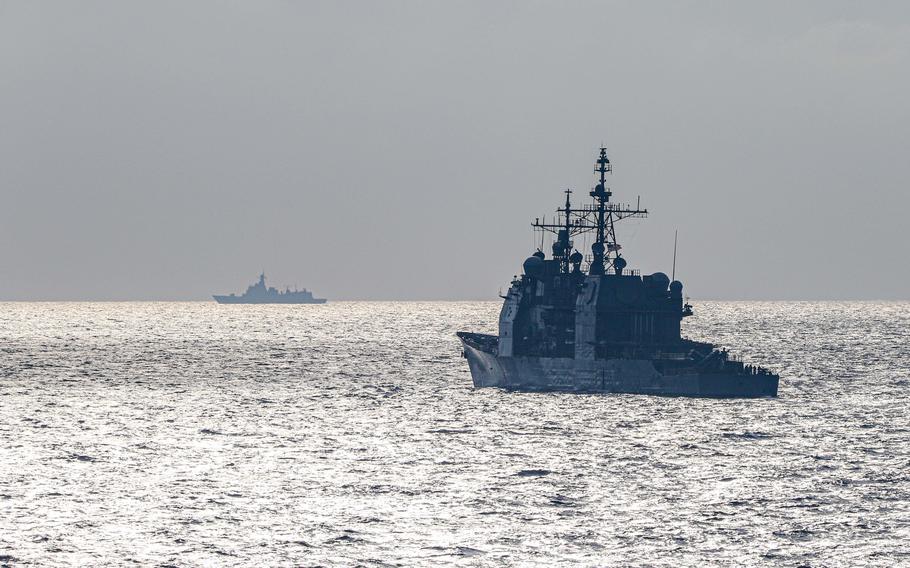
The USS Antietam, a Ticonderoga-class, guided-missile cruiser, transits the East China Sea in August 2022 during routine operations. (Justin Stack/U.S. Navy)
WASHINGTON — A government shutdown and limiting military aid to Ukraine could compromise security for Taiwan and persuade China to attempt a takeover of the island, defense officials told House lawmakers on Tuesday.
“Military aggression across the [Taiwan] Strait, whether in the form of an outright invasion, a blockade or other means, would risk human life and global prosperity unimaginable in this century,” said Ely Ratner, the Pentagon’s assistant secretary of defense for Indo-Pacific security affairs.
Ratner, Mira Resnick, a deputy assistant secretary of state for regional security, and Army Maj. Gen. Joseph McGee, the vice director for strategy, plans and policy for the Joint Staff, testified during a hearing of the House Armed Services Committee about U.S. defense cooperation with Taiwan.
They told lawmakers that a strong U.S. combat deterrence is necessary to keep China from attempting to forcefully “unify” with Taiwan, as Beijing has threatened to do. But also important, they said, is the U.S. military being fully funded and demonstrating in Ukraine that it lives up to its international commitments.
“We are developing and deploying breakthrough technologies required to prevent conflict in the decades ahead, and our budget seeks an unprecedented level of funding for research and development and for procurement,” Ratner said. “The [Defense] Department believes that existing authorities from Congress for security assistance to Taiwan should be met by full appropriations.”
Several committee members voiced concern about the impact of a government shutdown on efforts in the Indo-Pacific region, as well as calls by some House Republicans to restrict aid to Ukraine. The U.S. has so far given more than $40 billion in military aid to Ukraine since Russia invaded the country in early 2022. Ratner said a “full-year, on-time appropriation” should be one of the top U.S. priorities in keeping up an effective deterrence against Chinese aggression.
“We need that budget passed in full to be able to implement the [National Defense] Strategy,” he said. “A continuing resolution or a shutdown would inhibit our ability to do that.”
A continuing resolution is a stopgap measure Congress sometimes uses to avert a shutdown. It only extends funding levels temporarily to give lawmakers more time to pass funding bills.
The Pentagon’s National Defense Strategy last year identified China as the No. 1 “pacing challenge” for the U.S. and prioritized an effective deterrence to keep Beijing from expanding its influence in the Indo-Pacific region, which includes about three dozen countries in the Pacific and Indian oceans, such as Japan, South Korea and Australia.
To avoid a shutdown, Congress must pass the necessary appropriations bills before the fiscal year ends on Sept. 30. The Freedom Caucus, a bloc of hardline Republicans in the House, has threatened to hold up the process unless it gets concessions on various issues, such as money for a wall along the U.S.-Mexico border, removal of certain progressive reforms at the Pentagon, and restrictions in aid to Ukraine.
“When Congress is talking about cutting aid to Ukraine, abandoning commitments we have to Ukraine … if [partners] see that kind of discussion here in Congress, what effect will that have?” Rep. Bill Keating, D-Mass., asked at the hearing.
“Demonstrating our resolve with respect to Ukraine is the best way to deter [China],” Resnick answered. “Abandoning our partners encourages [China] to conclude that we will fail to provide for Taiwan’s sufficient self-defense. That is exactly the wrong message to be sending.”
Resnick also said Congress failing to agree on funding for fiscal 2024 also is a discouraging message for the defense industry.
“In the context of a shutdown, which we all would like to avoid, the Bureau of Political Military Affairs [at the State Department] in the past has been unable to process … new foreign military sales for any partner, including Taiwan. This is something we would like to avoid,” she said.
Last week, Army Gen. Charles Flynn, commander of U.S. Army Pacific, cautioned Chinese President Xi Jinping might consider acting against Taiwan sometime in the late 2020s.
“In my view, there are decisions he is likely going to have to make [around 2027],” Flynn said of the 70-year-old Xi. “His tenure in his current role would likely require him to be thinking about what his legacy is going to be, [and] he has stated publicly and unequivocally that he intends to unify [with Taiwan].”
Flynn emphasized land forces in the Indo-Pacific — not just air and maritime power — are going to be instrumental in maintaining a strategic deterrence against China and protecting U.S. interests and allies in the region, including Taiwan.
President Joe Biden’s administration has been alarmed by various Chinese actions recently, such as Beijing signing a new security agreement in early 2022 with the Solomon Islands, a small nation about 1,100 miles northeast of Australia. Defense experts on Tuesday expanded on that concern by emphasizing China’s interests go beyond Taiwan.
“In the last two years, we have seen a marked increase in [China’s] maritime and air activity as the [country] continues its pressure campaign against Taiwan and strives to increase its regional influence,” McGee said. “We are working to strengthen peace and stability across the Indo-Pacific region by delivering a forward leaning, cutting edge joint force, integrating with regional allies and partners and supporting our commitments.”
The United States has authorized new aid to Taiwan in recent weeks, including the first-ever transfer of military equipment to the island under the government’s foreign military funding program, which is usually reserved for sovereign nations. Washington does not formally recognize Taiwan as a sovereign country. The Biden administration also said last week that it would redirect millions in military aid from Egypt to Taiwan over human rights concerns in the African nation, according to news reports.